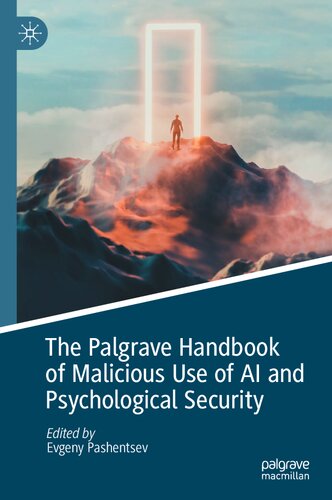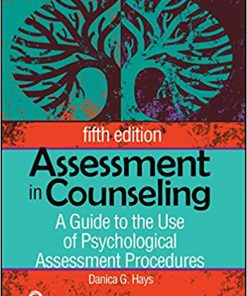The Palgrave Handbook of Malicious Use of AI and Psychological Security 1st edition Evgeny Pashentsev
$50.00 Original price was: $50.00.$25.00Current price is: $25.00.
The Palgrave Handbook of Malicious Use of AI and Psychological Security – Ebook Instant Download/Delivery ISBN(s): 9783031225512,3031225511

Product details:
- ISBN-10 : 3031225511
- ISBN-13 : 978-3031225512
- Author(s): Evgeny Pashentsev
This handbook focuses on new threats to psychological security that are posed by the malicious use of AI and how it can be used to counteract such threats. Studies on the malicious use of AI through deepfakes, agenda setting, sentiment analysis and affective computing and so forth, provide a visual representation of the various forms and methods of malicious influence on the human psyche, and through this on the political, economic, cultural processes, the activities of state and non-state institutions. Separate chapters examine the malicious use of AI in geopolitical confrontation, political campaigns, strategic deception, damage to corporate reputation, and activities of extremist and terrorist organizations. This is a unique volume that brings together a multidisciplinary range of established scholars and upcoming new researchers from 11 countries. This handbook is an invaluable resource for students, researchers, and professionals interested in this new and developing field of social practice and knowledge.
Table contents:
1. Introduction: The Malicious Use of Artificial Intelligence—Growing Threats, Delayed Responses
Part I. The Malicious Use of Artificial Intelligence Against Psychological Security: Forms and Methods
2. General Content and Possible Threat Classifications of the Malicious Use of Artificial Intelligence to Psychological Security
3. The Malicious Use of Deepfakes Against Psychological Security and Political Stability
4. Automating Extremism: Mapping the Affective Roles of Artificial Agents in Online Radicalization
5. Hate Speech in Perception Management Campaigns: New Opportunities of Sentiment Analysis and Affective Computing
6. The Malicious Use of Artificial Intelligence Through Agenda Setting
Part II. Areas of Malicious Use of Artificial Intelligence in the Context of Threats to Psychological Security
7. The COVID-19 Pandemic and the Rise of Malicious Use of AI Threats to National and International Psychological Security
8. Malicious Use of Artificial Intelligence in Political Campaigns: Challenges for International Psychological Security for the Next Decades
9. Destabilization of Unstable Dynamic Social Equilibriums and the Malicious Use of Artificial Intelligence in High-Tech Strategic Psychological Warfare
10. Current and Future Threats of the Malicious Use of Artificial Intelligence by Terrorists: Psychological Aspects
11. Malicious Use of Artificial Intelligence and the Threats to Corporate Reputation in International Business
Part III. Regional and National Implications of the Malicious Use of Artificial Intelligence and Psychological Security
12. Malicious Use of Artificial Intelligence: Risks to Psychological Security in BRICS Countries
13. The Threats and Current Practices of Malicious Use of Artificial Intelligence in Psychological Security in China
14. Malicious Use of Artificial Intelligence, Uncertainty, and U.S.–China Strategic Mutual Trust
15. Scenario Analysis of Malicious Use of Artificial Intelligence and Challenges to Psychological Security in India
16. Current and Potential Malicious Use of Artificial Intelligence Threats in the Psychological Domain: The Case of Japan
17. Geopolitical Competition and the Challenges for the European Union of Countering the Malicious Use of Artificial Intelligence
18. Germany: Rising Sociopolitical Controversies and Threats to Psychological Security from the Malicious Use of Artificial Intelligence
19. Artificial Intelligence and Deepfakes in Strategic Deception Campaigns: The U.S. and Russian Experiences
20. Malicious Use of Artificial Intelligence and Threats to Psychological Security in Latin America: Common Problems, Current Practice and Prospects
21. Malicious Use of Artificial Intelligence and the Threat to Psychological Security in the Middle East: Aggravation of Political and Social Turbulence
Part IV. Future Horizons: The New Quality of Malicious Use of Artificial Intelligence Threats to Psychological Security
22. Malicious Use of Artificial Intelligence in the Metaverse: Possible Threats and Countermeasures
23. Unpredictable Threats from the Malicious Use of Artificial Strong Intelligence
24. Prospects for a Qualitative Breakthrough in Artificial Intelligence Development and Possible Models for Social Development: Opportunities and Threats
25. Conclusion: Per Aspera Ad Astra
People also search:
the palgrave handbook on the philosophy of punishment
the palgrave handbook
the palgrave handbook of anarchism
the palgrave handbook to horror literature
the palgrave handbook of ethnicity
the palgrave handbook of methods for media policy research
the palgrave handbook of american mental health policy
the palgrave handbook of critical theory
You may also like…
Politics & Philosophy - Social Sciences
Poetry - American Poetry
History & Research
The Palgrave Handbook Of Psychological Perspectives On Alcohol Consumption 1st Edition Richard Cooke
Business & Economics - Personal Finance
The Palgrave Handbook of FinTech and Blockchain 1st ed. 2021 Edition Maurizio Pompella
Politics & Philosophy - Social Sciences
The Palgrave Handbook of Gender and Migration Claudia 3030633470 9783030633479
Politics & Philosophy - Warfare & Defence
The Palgrave Handbook Of National Security 1st Edition Michael Clarke
Poetry - Inspirational & Religious Poetry













